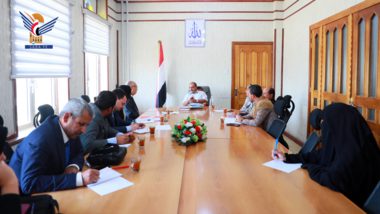Humanitarian Affairs Council, UNESCO discuss damages suffered by historical cities
Secretary-General of the Supreme Council for the Management and Coordination of Humanitarian Affairs and International Cooperation, Ibrahim Al-Hamli, discussed on Saturday the damage suffered by historical cities due to the aggression coalition and the effects of heavy rains with Salah Khaled, the UNESCO Office’s Director in the Gulf States and Yemen.
Al-Hamli denounced the aggression countries’ targeting of archaeological sites, looting, and stealing Yemeni antiquities in light of UNESCO’s silence.
The Humanitarian Affairs Council’s Secretary-General briefed the UNESCO delegation on the conditions of the Old City of Sana’a, Al-Qahira Citadel in Hajjah, and other historical cities, which are included in the World Humanitarian Heritage List, and are threatened with collapse due to direct and indirect systematic destruction by the aggression coalition.
Al-Hamli highlighted the importance of resuming the work of the UNESCO office in Sana’a to rehabilitate and restore historical cities, particularly the houses in the Old City of Sana’a, which were directly and indirectly destroyed by the aggression coalition.
He noted that UNESCO’s coordination with the Humanitarian Affairs Council is essential for the implementation of projects.
In turn, the Director of the UNESCO Office considered the preservation of historical cities an essential and important part of the organization’s priorities to preserve the world’s human heritage in accordance with the agreements concluded with government agencies in this field.

